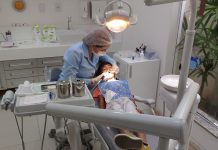 July is Cord Blood Awareness Month! In recognition, Birmingham Mom Collective was eager to talk with our UAB Medicine expert, Dr. Brian Casey, to learn more about cord blood donation and the ways we can get involved.
July is Cord Blood Awareness Month! In recognition, Birmingham Mom Collective was eager to talk with our UAB Medicine expert, Dr. Brian Casey, to learn more about cord blood donation and the ways we can get involved.
Dr. Casey serves as the Maternal-Fetal Medicine Division Director and Vice Chair of Obstetrics at UAB Medicine. For the past two years, Dr. Casey and UAB Medicine have partnered with LifeSouth Cord Blood Bank to provide patients with the opportunity to participate in cord blood donation. LifeSouth is a community-based public cord blood bank managed by LifeSouth Community Blood Centers that collects and stores umbilical cord blood for clinical cures and stem cell transplantation research. This partnership has opened doors for women giving birth at UAB Medicine to make an impact on medical research and provide a valuable resource used to treat life-threatening diseases.
What Exactly Is Cord Blood?

Cord blood is the blood remaining in the umbilical cord and placenta after a baby is born. It is rich in stem cells that generate new blood cells.
Cord blood can be used to treat patients with blood cancers and other life-threatening diseases like sickle cell disease and aplastic anemia. Cord blood can also be used in transplantation. It’s particularly helpful in cases where a transplant is required quickly, as cord blood is stored and ready for use. There are more than 80 diseases where using cord blood could save a life!
Who Is Eligible?
Mothers delivering a healthy, single baby at UAB Women & Infants Center are generally eligible to donate cord blood. The cord blood donation process doesn’t affect the labor or delivery in any way. Donating the remaining umbilical cord blood after cord clamping gives a valuable resource that would otherwise be discarded. LifeSouth does not store donated blood for private use but instead makes all donated blood available to the public.
 Donating mothers complete the registration, background, family history, and risk assessment questionnaires to determine whether the unit can be stored and made available for transplant. Qualifying cord blood cells are frozen at a controlled rate and stored in a liquid nitrogen cryostorage holding tank. The cord blood cells remain viable for years. How amazing that a one-time donation can make a difference for years to come!
Donating mothers complete the registration, background, family history, and risk assessment questionnaires to determine whether the unit can be stored and made available for transplant. Qualifying cord blood cells are frozen at a controlled rate and stored in a liquid nitrogen cryostorage holding tank. The cord blood cells remain viable for years. How amazing that a one-time donation can make a difference for years to come!
Successful Partnership
Dr. Casey is proud to say that since beginning umbilical cord collections in February of 2022, UAB Medicine has successfully collected over 1,250 samples! In his words, “This has been an enormously successful initiative that is a joint effort between nurses, physicians, and of course, our generous patients at UAB Medicine.”
Congratulations to UAB Medicine and LifeSouth on such a worthy partnership that benefits us all!











